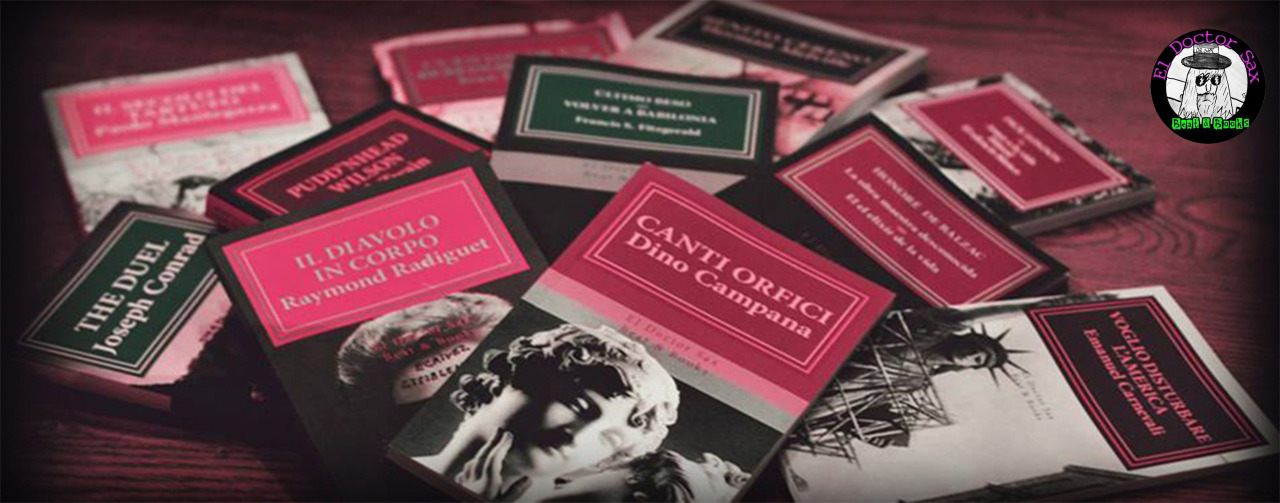Showing posts with label Melville. Show all posts
Showing posts with label Melville. Show all posts
05 July 2019
31 January 2018
31 December 2017
BENITO CERENO - Herman Melville
TRADUZIONE E POSTFAZIONE DI
CRISTINA VITAGLIANO
CRISTINA VITAGLIANO
Benito Cereno, pubblicato per la prima volta nel 1855, è un altro romanzo in cui l'autore prende spunto dalla sua esperienza da marinaio. È un modello di sintesi e di stile, dove Melville dipinge con colori plumbei una storia fitta di mistero e ambiguità: nel 1799, il capitano americano Amasa Delano ancorò nella baia di un'isola deserta al largo della costa cilena. Il mattino dopo apparve una misteriosa nave, la San Dominick. Questa era una nave negriera decimata da una tempesta e da un'epidemia. I marinai bianchi vivevano con i neri, senza provviste e in un malgoverno allarmante. Lì Delano incontrò il debole e malaticcio capitano Benito Cereno, che gli raccontò gli orrori del suo viaggio. Equivoci e diffidenza, passi descrittivi, altri allegorici, argomenti come il razzismo e la colonizzazione, sono tutti i temi che con il suo stile agile Melville riesce ad affrontare in questo libro così controverso, catturando il lettore sin dalle prime battute.
Herman Melville (New York, 1819 - 1891) all'età di undici anni si trasferì con la famiglia ad Albany, dove studiò fino a quando, a causa della bancarotta degli affari di famiglia, dovette cercarsi un lavoro. La difficoltà di trovare un lavoro stabile lo portò, nel 1841, ad arruolarsi su una baleniera. Il risultato delle sue esperienze in mare furono Typee (1846) e Omoo (1847). Nel 1850 pubblicò Moby Dick, un romanzo considerato una delle grandi opere della letteratura universale, che nascondeva la metafora del mondo e della natura umana: l'incessante ricerca dell'assoluto che sfugge sempre e la convivenza del bene e del male nell'uomo, andando oltre un argomento apparentemente semplice, come l'ossessione del capitano Achab per Moby Dick, la balena bianca.
«Ogni cosa era muta e calma, ogni cosa era grigia. Il mare, sebbene ondulato da lunghe increspature di schiuma, sembrava immobile ed era lucido in superficie, come il piombo fuso quando si raffredda e si indurisce nello stampo. Il cielo sembrava un mantello grigio. Stormi di uccelli grigi e inquieti, il cui oscuro aspetto si mescolava in tutto e per tutto a grigi e inquieti stormi di vapori e nuvole, sfioravano l’acqua come le rondini sfiorano i prati prima di una tempesta. Ombre presenti, che presagivano ombre ben più fitte in arrivo».
Herman Melville
01 March 2017
THE CONFIDENCE MAN - Herman Melville
Published on the day it is set, April Fool’s Day 1857, The Confidence-Man concerns a group of passengers travelling the Mississippi by steamboat (aptly named the Fidèle) and their various onboard encounters with an enigmatic conman figure (who appears throughout in a variety of disguises). Poorly received at the time of its first publication, The Confidence-Man was indeed Melville’s last novel — he would thereafter turn to poetry and resumed prose fiction only much later in 1885 with the commencement of the unfinished Billy Budd, Sailor. Though largely misunderstood in the mid-19th century, the novel and its central message — that the art of the con lies at the heart of American society — began to garner more appreciation and salience as the decades rolled on. Orson Welles was said to have wanted to make it his first film, before eventually settling for Citizen Kane.
HERMAN MELVILLE (1819-1891) was born in New York. Family hardships forced him to leave school for various occupations, including shipping as a cabin boy to Liverpool in 1839, a voyage that sparked his love for the sea. A shrewd social critic and philosopher in his fiction, he is considered an outstanding writer of the sea and a great stylist who mastered both realistic narrative and a rich, rhythmical prose.
«The relevant book about Trump’s American forebear is Herman Melville’s ‘The Confidence-Man,’ the darkly pessimistic, daringly inventive novel that could just as well have been called “The Art of the Scam”».
Philip Roth
«What started this was, to account, if necessary, for the changed air of the man with the weed, who, throwing off in private the cold garb of decorum, and so giving warmly loose to his genuine heart, seemed almost transformed into another being. This subdued air of softness, too, was toned with melancholy, melancholy unreserved; a thing which, however at variance with propriety, still the more attested his earnestness; for one knows not how it is, but it sometimes happens that, where earnestness is, there, also, is melancholy».
14 December 2016
BENITO CERENO - Herman Melville
"Benito Cereno" is a novel by Herman Melville, a fictionalized account about the revolt on a Spanish slavery ship captained by Don Benito Cereno, first published in 1855. Off the coast of Chile, captain Amasa Delano of the American merchant ship Bachelor's Delight visits the San Dominick, a Spanish slave ship apparently in distress. After learning from its captain Benito Cereno that a storm has taken many crewmembers and provisions, Delano offers to help out. He notices that Cereno acts awkwardly passive for a captain and the slaves display remarkably inappropriate behavior, and though this piques his suspicion he ultimately decides he is being paranoid. Employing a third-person narrator who reports Delano's point of view without any correction, the story has become a famous example of unreliable narration.
Herman Melville (1819-1891) was born in New York. Family hardships forced him to leave school for various occupations, including shipping as a cabin boy to Liverpool in 1839, a voyage that sparked his love for the sea. A shrewd social critic and philosopher in his fiction, he is considered an outstanding writer of the sea and a great stylist who mastered both realistic narrative and a rich, rhythmical prose.
«Such were the American’s thoughts. They were tranquillizing. There was a difference between the idea of Don Benito’s darkly preordaining Captain Delano’s fate, and Captain Delano’s lightly arranging Don Benito’s. Nevertheless, it was not without something of relief that the good seaman presently perceived his whale-boat in the distance. Its absence had been prolonged by unexpected detention at the sealer’s side, as well as its returning trip lengthened by the continual recession of the goal».
29 October 2016
BENITO CERENO - Herman Melville
 Herman Melville (Nueva York, 1819 - 1891) a los once años se trasladó con su familia a Albany, donde estudió hasta que, por la quiebra de la empresa familiar, tuvo que ponerse a trabajar. La dificultad para encontrar un empleo estable le llevó, en 1841, a enrolarse en un ballenero. Fruto de sus experiencias en el mar fueron Typee (1846) y Omoo (1847). En 1850 publicó Moby Dick, novela considerada una de las grandes obras de la literatura universal, que escondía la metáfora del mundo y la naturaleza humana: la incesante búsqueda del absoluto que siempre se escapa y la coexistencia del bien y del mal en el hombre. Esto tras un argumento aparentemente simple: la obsesión del capitán Achab por matar a Moby Dick, la ballena blanca.
Herman Melville (Nueva York, 1819 - 1891) a los once años se trasladó con su familia a Albany, donde estudió hasta que, por la quiebra de la empresa familiar, tuvo que ponerse a trabajar. La dificultad para encontrar un empleo estable le llevó, en 1841, a enrolarse en un ballenero. Fruto de sus experiencias en el mar fueron Typee (1846) y Omoo (1847). En 1850 publicó Moby Dick, novela considerada una de las grandes obras de la literatura universal, que escondía la metáfora del mundo y la naturaleza humana: la incesante búsqueda del absoluto que siempre se escapa y la coexistencia del bien y del mal en el hombre. Esto tras un argumento aparentemente simple: la obsesión del capitán Achab por matar a Moby Dick, la ballena blanca.Benito Cereno publicada por entregas en 1855, es otra novela donde el autor plasma su experiencia de marinero. Se trata de un modelo de síntesis y estilo, donde Melville pinta con colores plomizos una historia que bordea el misterio y el terror: en 1799, el capitán norteamericano Amasa Delano ancló en la bahía de una isla desierta del litoral chileno. A la mañana siguiente apareció un misterioso barco, el Santo Domingo. Aquél era un barco de esclavos que la tempestad y una epidemia habían diezmado. Los marineros blancos convivían con los negros, sin provisiones y en desgobierno alarmante. Allí Delano conoció al débil y enfermizo capitán Don Benito, quien le explicó los horrores de su travesía. Equívocos y miedos, pasajes descriptivos y simbolistas, temas como el racismo y la colonización, con su estilo ágil Melville consigue atrapar al lector desde las primeras líneas. : “Benito Cereno sigue suscitando polémicas. Hay quien lo juzga la obra maestra de Melville y una de las obras maestras de la literatura.
"Hay quien lo considera un error o una serie de errores. Hay quien ha sugerido que Herman Melville se propuso la escritura de un texto deliberadamente inexplicable que fuera un símbolo cabal de este mundo, también inexplicable”.
Subscribe to:
Comments (Atom)




























